|
Novels
|

Purchase on Amazon
|
A Summer of Peas and
Pickles
(March, 2022)
Purchase on Amazon
Bill Steiner, a farm boy, has just completed his first year of
studies at the University of Wisconsin. To return to college in the
fall, he knows he needs extra money. He takes a job at a pea cannery
where he manages a small group of men. One of them, an alcoholic,
threatens Bill with a gun when Bill empties the worker’s bottle.
Later in the summer, Bill manages a small pickle factory. He is
learning that being the boss is more than a little challenging.
Working with men processing peas and pickles offers learning
experiences for Bill well beyond what he expected.
Buy Local with
Bookshop.org. |
|
|

Purchase on Amazon
|
Settlers Valley
(March, 2021).
Purchase on Amazon
In this eminently readable story, Jerry Apps delves into the heart of
small-town America. Reckoning with timely problems and opinions that
divide us, he shows us the power in restoring our relationships with
nature and our communities.
Reviews:
“A heck of a read. Settlers Valley comfortably ambles in typical
Jerry Apps fashion even as chapters bristle with action and explore
complex issues of the day. Every page is a reminder of his deep
understanding of and love for rural Wisconsin.”—Bill Berry, author
of Banning DDT: How Citizen Activists in Wisconsin Led the Way
“Apps weaves a story of intrigue as a rural settlement of veterans
finds itself up against unimagined odds. Flames leap, gunshots
crackle, lovers swoon as a once peaceful Wisconsin valley is
fractured by deception, hatred, and the remnant stresses of
war.”—Jim Guhl, author of Eleven Miles to Oshkosh
Buy Local with
Bookshop.org.
|
|
|
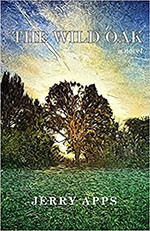
Purchase on Amazon
|
The Wild Oak
(March, 2021).
Purchase on Amazon
Billy Steiner, 16, is trying to decide what to do after high school,
when so many adults seem to have predetermined this for him. Bill's
search for answers is complicated when he encounters the mysterious
happenings of the Wild Oak. Stories from the past say this tree
allows people to look ahead in time. In a setting that portrays
small-town and farm life in the 1950s, Bill is determined to solve
the mystery of the tree so he can visualize his future and make
decisions about the direction his life should take.
Buy Local with
Bookshop.org.
|
|
|

Purchase on Amazon
|
Cold as Thunder
(May, 2018).
Purchase on Amazon
Since the Eagle Party took power in the United States, all schools and
public utilities have been privatized, churches and libraries
closed, and independent news media shut down. Drones buzz overhead
in constant surveillance of the populace, and the open internet has
been replaced by the network of the New Society Corporation.
Environmental degradation and unchecked climate change have brought
raging wildfires to the Western states and disastrous flooding to
Eastern coastal regions.
In the Midwest, a massive storm sends Lake Michigan surging over the
Door County peninsula, and thousands of refugees flee inland. In the
midst of this apocalypse, a resourceful band of Wisconsin sixty-somethings
calling themselves the Oldsters lays secret plans to fight the
ruling regime's propaganda and show people how to think for
themselves.
|
|
|
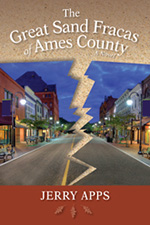
Purchase on Amazon
|
The Great
Sand Fracas of Ames County: A Novel (Terrace Books,
September, 2014).
Purchase on Amazon
When the Alstage Mining Company proposes a frac sand mine in the small
Ames County village of Link Lake, events quickly escalate to a
crisis. Business leader Marilyn Jones of the Link Lake Economic
Development Council heads the pro-mine forces, citing needed jobs
and income for the county. Octogenarian Emily Higgins and other Link
Lake Historical Society members are aghast at the proposed mine
location in the community park, where a huge and ancient bur oak—the
historic Trail Marker Oak—has stood since it pointed the way along
an old Menominee trail. Reluctantly caught in the middle of the fray
is Ambrose Adler, a reclusive, retired farmer with a secret.
Soon the fracas over frac sand attracts some national attention,
including that of Stony Field, the pen name of a nationally
syndicated columnist. Will the village board vote to solve their
budget problems with a cut of the mining profits? Will the mine
create real jobs for local folks? Will Stony Field come to the
village to lead protests against the mine? And will defenders of the
Trail Marker Oak literally draw a battle line in the sand?
"Once again, Jerry Apps has tapped into a highly controversial issue
to explore contemporary Midwestern values—historical preservation
versus forces of change, environmental protection versus economic
opportunity. And once again, Apps succeeds brilliantly. He is an
articulate and forceful voice for the Wisconsin ethos."—Jerry
Minnich, author of The Wisconsin Almanac
"Jerry Apps has given us another gift with his latest installment in
the fictional Ames County saga. The Great Sand Fracas of Ames County
will transport you to Ames County's community of Link Lake and make
you one of the regulars at its cafes and supper clubs. Those
familiar with the rural Upper Midwest will feel right at home and
newcomers will get a crash course in the rhythms and controversies
along the fault lines between economic development, conservation,
and historic preservation."—Dennis Boyer, author of Listen to the
Land
"Jerry Apps was born and raised on a Wisconsin farm and draws from his
personal experiences and his cultural surroundings in all of the
novels in his Ames County series. "The Great Sand Fracas Of Ames
Country" is the latest and perhaps the best in an already
outstanding roster of five previous works of homespun fiction.
Solidly entertaining and very highly recommended reading, "The Great
Sand Fracas Of Ames Country" will prove to be an enduringly popular
addition to community library collections." - Midwest Book Review
From Farm to Typewriter, Jerry Apps' Journey By Doug Moe
|
|
|
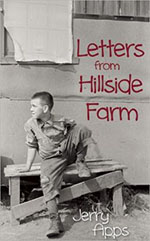
Purchase on Amazon
|
Letters from
Hillside Farm (Fulcrum Publishing, April, 2013).
Purchase on Amazon
"Apps adroitly weaves factual information about the difficulties of
life during the Depression with the fictional story of George to
create a snapshot of a different time for today’s youth, much like
Patricia Reilly Giff in My Name Is Rachel." –Booklist
Told through the correspondence between twelve-year-old George
Struckmeyer and his grandmother, Letters from Hillside Farm provides
a glimpse into life during the Great Depression of the 1930s. The
Struckmeyer family is forced to move to a rented farm in central
Wisconsin after George’s father, Adolph, loses his factory job in
Cleveland, Ohio. George shares his discovery of rural life, the
challenges of being an outsider in a new place, and the realities of
tough times.
Infusing the real-life stories that make up history with his own
experiences growing up on a Wisconsin farm, master storyteller Jerry
Apps captures George’s struggles to adjust to a new life of milking
cows, plowing fields, and walking to a one-room schoolhouse. George
not only must help his family survive the Depression, but he also
must endure what every adolescent has to: growing up.
(Sample) Dear Grandma,
This morning . . . our telephone rang. . . . We are on a party-line,
which means that several people in our neighborhood are all
connected to the same . . . line and the only way you know when to
answer the telephone is when you hear your own special ring. Our
ring is a long ring and three short rings.
After Ma answered the phone, she turned to Pa and said it was a call
for him. As he listened, a big grin spread across his face. Then he
said thank you, hung up the receiver, and asked if I'd like to ride
into town with him. . . . He was still grinning.
During the Great Depression, families were uprooted as millions lost
their jobs. The fictional Struckmeyer family was one such family.
After father Struckmeyer looses his factory job in Cleveland, the
family borrows some money from Grandma so they can rent a farm in
Wisconsin and buy animals and equipment.
Told through the correspondence between the young narrator George
Struckmeyer and his grandmother, Letters from Hillside Farm provides
a glimpse into the day-to-day lives of those who lived through the
difficult 1930s. Infusing the real-life stories that make up history
with personal experience, Jerry Apps details George's discovery of
rural life and the realities of tough times.
Jerry Apps writes novels and nonfiction about the outdoors and rural
living. He received the 2008 First Place Nature Writing Award from
the Midwest Independent Publishers Association and the 2007 Major
Achievement Award from the Council for Wisconsin Writers.
|
|
|
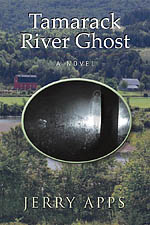
Purchase on Amazon
|
Tamarack River Ghost: A
Novel (University of
Wisconsin Press, November, 2012).
Purchase on Amazon
|
Press Kit
When journalist Josh Wittmore moves from the Illinois bureau of Farm
Country News to the newspaper’s national office in Wisconsin, he
encounters the biggest story of his young career—just as the paper’s
finances may lead to its closure.
Josh’s big story is that a corporation that plans to establish an
enormous hog farm has bought a lot of land along the Tamarack River
in bucolic Ames County. Some of the local residents and officials
are excited about the jobs and tax revenues that the big farm will
bring, while others worry about truck traffic, porcine aromas, and
manure runoff polluting the river. And how would the arrival of a
large agribusiness affect life and traditions in this tightly knit
rural community of family farmers? Josh strives to provide impartial
agricultural reporting, even as his newspaper is replaced by a new
Internet-only version owned by a former New York investment banker.
And it seems that there may be another force in play: the vengeful
ghost of a drowned logger who locals say haunts the valley of the
Tamarack River.
|
|
|
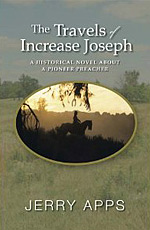
Purchase on Amazon
|
The Travels of Increase Joseph: A Historical Novel
About a Pioneer Preacher (Paperback Edition, University of
Wisconsin Press, July, 2010).
Purchase on Amazon
Inspired by actual events that took place in upstate New York and
Wisconsin in the mid-nineteenth century, The Travels of Increase
Joseph is the first in Jerry Apps’s series set in fictional Ames
County, Wisconsin. The four novels in the series—which also includes
In a Pickle, Blue Shadows Farm, and the forthcoming Cranberry
Red—all take place around Link Lake at different points in history.
They convey Apps’s deep knowledge of rural life and his own concern
for land stewardship.
Reviews:
It only seems as if Jerry Apps has written a couple hundred books, but
it has to be at least a dozen by now, on subjects including beer and
barns, circus and one-room schools. He’s even written a couple of
fine children’s books.
It took him a long time to get around to writing a novel, but it was
worth the wait. The Travels of Increase Joseph depicts a
make-believe rural preacher in the real world of Wisconsin from
pre-Civil War days to the turn of the Century, and it grabs and
holds your interest all the way.
Like all of Jerry’s books, Travels is steeped in meticulous research,
but this time Jerry has let his imagination have at the facts. We
follow the career of Increase Joseph Link from the time he gets
drummed out of theology school until his death. His calling to
preach comes in the form of a literal lightning bolt and leads him
to form the church of the Standalone Fellowship, based on teachings
contained in a mysterious red book the preacher keeps with him at
all times and never lets anyone else read. When not preaching
a gospel of God, man, and the land, pastor Link peddles a cure-all
tonic (the recipe also remains his secret, but I'm betting on a high
alcohol content) that sells for "50 cents, or two for a dollar."
It's a wonderful read and an education in Wisconsin history and the
formation of America. I highly recommend it. Marshal Cook
The Travels Of Increase Joseph by Jerry Apps is a superbly crafted
historical novel of a pioneer preacher who came to the wildlands of
Wisconsin in 1852 with his small gathering of followers, the
Standalone Fellowship. Supporting the Fellowship by selling his
special curative tonic, and delivering oratory and with powerful
messages that are nothing short of spellbinding, Joseph Link dared
to speak out as he journeyed and his words and ideas made an
impression that stayed. The Travels Of Increase Joseph is a most
thoughtful and wonderfully entertaining read. Jerry Apps writes with
vibrant character and has a penchant for making Wisconsin history
come alive. Midwest Book Review.
Other Reviews: Fitchburg Star
|
|
|
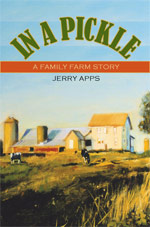
Purchase on Amazon |
In a
Pickle: A Family Farm Story
(September, 2007)
Jerry Apps in his latest novel, In a Pickle, is a
many-layered pleasure delivered by a master craftsman who is also,
like his contemporaries Studs Terkel and Howard Zinn, a passionate
student of the people’s history. As Apps engages us in the
coming-of-age saga of the pickle factory manager Andy Meyer, his
In a Pickle is at once a lesson in rural Wisconsin sociology, a
quietly scathing indictment of factory farming, and a great
read.”—John Galligan.
Click here for Reviews of "In a
Pickle: A Family Farm Story"
Purchase on Amazon
|
|
|
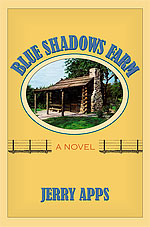
Purchase on Amazon
|
Blue Shadows Farm
(September, 2009) "Jerry Apps unravels a family secret
that arcs across three generations and delivers a surprising answer
for one descendant."
—Philip Hasheider, contributing author to Seasons on the Farm
Fans of Jerry Apps will delight in his latest novel, Blue Shadows
Farm, which follows the intriguing family story of three generations
on a Wisconsin farm.
Silas Starkweather, a Civil War veteran, is drawn to Wisconsin and
homesteads 160 acres in Ames County, where he is known as the
mysterious farmer forever digging holes. After years of hardship and
toil, however, Silas develops a commitment to farming his land and
respect for his new community. When Silas’s son Abe inherits Blue
Shadows Farm he chooses to keep the land out of reluctant necessity,
distilling and distributing “purified corn water” throughout
Prohibition and the Great Depression in order to stay solvent. Abe’s
daughter, Emma, willingly takes over the farm after her mother’s
death. Emma’s love for this place inspires her to open the farm to
school- children and families who share her respect for it. As she
considers selling the land, Emma is confronted with a difficult
question—who, through thick and thin, will care for Blue Shadows
Farm as her family has done for over a century? In the midst of a
controversy that disrupts the entire community, Emma looks into her
family’s past to help her make crucial decisions about the future of
its land.
Finalist, General Fiction, Midwest book Wards, 2010
Reviews:
Many books have good stories, but too often end
up with the reader feeling that the story was better than what the
writer did with it. Likewise, many really good writers
unfortunately just don’t have very good stories to tell. But Jerry
Apps scores big time on both counts with Blue Shadows Farm. It’s an
exceptionally well-crafted tale, spread over three generations of
Starkweathers.
From Silas Starkweather, a wounded Civil War
soldier who homesteads the farm in rural central Wisconsin, through
Emma his grand-daughter who ushers in the 21st century,
the book chronicles their trials and triumphs through their
relationships with their neighbors and the land. But Blue Shadows
Farm is not a straight linear account of their lives. Successive
chapters go back and forth among all three generations, creating
interconnected timelines. From Silas Starkweather, a wounded Civil
War soldier who homesteads the farm in rural central Wisconsin,
through Emma, his grand-daughter who ushers in the 21st century, the
book chronicles their trials and triumphs through their
relationships with their neighbors and the land.
Apps' smooth narrative, vivid descriptions and natural dialogue
effectively weave the stories together into a large, coherent
tapestry, covering a century-and-a-half of change on their farm and
in the surrounding community. Each compact chapter is filled with a
wealth of details about the era in which that chapter's specific
events occur, providing you with a fine taste of the vintage
realities of rural life during each period.
It all comes together seamlessly and very effectively, including the
mystery of an underlying theme that is an intriguing and satisfying
part of the story. As you read and enjoy the literary pleasures of
Blue Shadows Farm, it will inevitably expand your perspectives on
how things were and how they are. You can't help but learn some
significant things in this historical novel that's as much or more
history as it is novel.
With Blue Shadows Farm, Jerry Apps has penned another gem in his
long line of superb books. This one gives irrefutable proof that his
craftsmanship as a writer is outstanding and the tales he tells are
truly good stories. Nowadays, that is a hard-to-find and
much-to-be-treasured combination. Jim Pope, Amazon.com.
Purchase on Amazon |
|
|
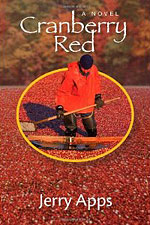
Purchase on Amazon
|
Cranberry Red - October, 2010 From
Publishers Weekly:
The fourth title in Apps's Ames County, Wis., series offers a
feel-good slice of 21st-century life in smalltown U.S.A. When his
job is eliminated, Ben Wesley had been an Ames County agricultural
agent for two decades. After breaking the news to his often
difficult wife, Beth, a registered nurse, Ben is offered a more
lucrative position as a œresearch application specialist � by a new
online, for-profit university, which means he has to start charging
fees for his services, a change he's none too happy about. He also
has to aggressively market the university's scientifically developed
miracle fruit, Cranberry Red. Claims of improved health from its
higher antioxidant content clash with a lack of adequate product
testing that leaves its side effects on humans uncertain. Ben has
grave concerns, butting heads with Brittani Stone, his ambitious,
by-the-book office manager, and seeks the counsel of his old fishing
pal, Lars Olson. Despite all the drama, there's time for such rural
staples as the county fair and family cookouts before the truly
disturbing aspects of Cranberry Red emerge in Apps's satisfying
outside-the-city-limits tale. Copyright © Reed Business
Information, a division of Reed Elsevier Inc. All rights reserved.
From Booklist:
In the fourth book in the Ames County series, Ben Wesley, an
agricultural agent for the past two decades, is suddenly out of work
when funding for his program is cut. He’s immediately offered a job
with Osborne University, doing pretty much what he did before but
charging people for his services. This makes him a little
uncomfortable but not nearly as much as Cranberry Red, a new
chemical developed by the university’s researchers that could have
spectacular benefits for people with heart disease or Alzheimer’s.
When it begins to appear that Cranberry Red has some pretty nasty
side effects, Ben is faced with a difficult choice: keep his job and
find a way to protect the community, or blow the lid off the secret
and risk everything. Apps approaches his familiar themes (honor, the
importance of community, the increasing threat to traditional
farming) from a new angle, focusing on the issue of genetic
modification and its impact on an entire way of life. As usual, he
creates compelling characters and places them in a vividly realized
setting. --David Pitt
Purchase on Amazon |
|
|

